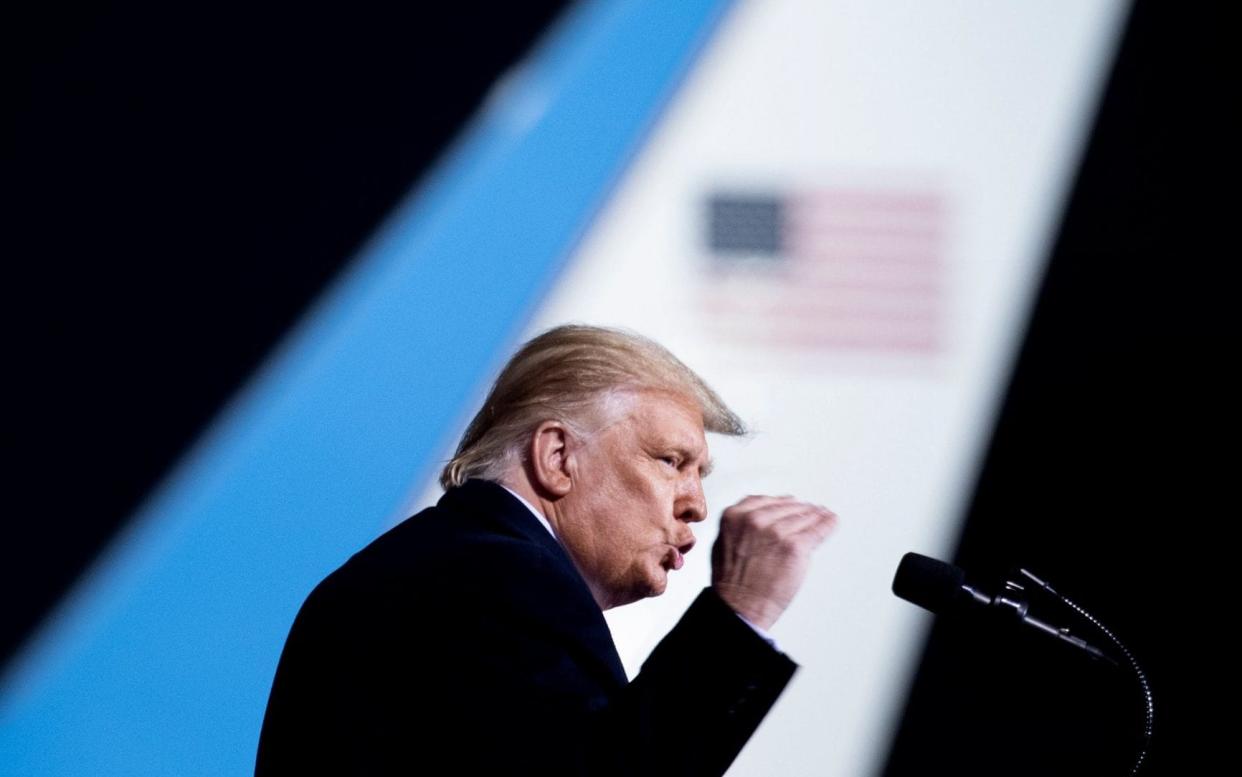Trump demands new Supreme Court judge 'without delay' as US election upended by death of Ginsburg

Donald Trump has vowed to defy Ruth Bader Ginsburg's dying wish and nominate her replacement immediately, igniting a tumultuous political battle that could determine the result of the US election in November.
In doing so the president will redraw the electoral battle lines, making the vote less a referendum on his handling of the coronavirus, and instead an ideological fight over the future of the US Supreme Court. His campaign suggested it was a game-changing development.
Mr Trump said: "We were put in this position of power and importance to make decisions for the people who so proudly elected us, the most important of which has long been considered to be the selection of United States Supreme Court Justices. We have this obligation, without delay!"
Joe Biden, Barack Obama, and the Democrat leadership in the Senate immediately called for the nomination to be delayed until after the election.
But Mitch McConnell, the Republican Senate leader, vowed to press ahead with confirming Mr Trump's nominee.

He said: "President Trump’s nominee will receive a vote on the floor of the United States Senate."
The Senate only has to confirm by a simple majority, and Republicans currently hold power with 53 seats to 47.
However, several of the party's more moderate senators - including Mitt Romney of Utah, Susan Collins of Maine, and Lisa Murkowski of Alaska - may be reluctant to ram through the new nominee in an election year.
The confirmation process usually takes about two months so that means it could take place after Nov 3, during the "lame duck" period before the inauguration of Mr Trump or Mr Biden on January 20.
If Mr Trump were to lose, and Republicans drop seats in the Senate, the fate of his nominee would become uncertain.
Mr McConnell wrote to his Republican colleagues urgently telling them to "keep their powder dry". He said: "This is not the time to prematurely lock yourselves into a position you may later regret."
A recent Pew Research Center survey showed that, even before Justice Ginsburg's death, the Supreme Court was a more important issue to US voters than the coronavirus.
Alex Conant, a Republican strategist, said: "Joe Biden wants this election to be a referendum on Trump. Now it's going to be a referendum on whoever he nominates to the Supreme Court. It's hard to see how this doesn't help Trump politically."
Mr Trump would become the first president since Ronald Reagan to nominate three justices to the nine-member bench.
That would give the court a 6-3 conservative majority, securing its ideological leaning for a generation and cementing Mr Trump's legacy.
The court decides issues that are fundamental to US society including on abortion, the environment, gay rights, the power of the presidency, and gun control.
Female voters in the suburbs are expected to be key to the election result, and it is probable Mr Trump will nominate a woman to replace Justice Ginsburg.
The favourite is Amy Coney Barrett, a devoutly Catholic appeal court judge in Chicago who was considered for Mr Trump's two previous nominations, and has already been vetted by the White House Counsel's Office.
In her deathbed statement Justice Ginsburg, who had publicly criticised Mr Trump, said: "My most fervent wish is that I will not be replaced until a new president is installed."
Her passing may galvanise liberals to turn out in large numbers for Mr Biden in an attempt to secure her legacy.
Mr Biden, who has already pledged to nominate the first black woman to the Supreme Court, said: "Let me be clear that the voters should pick the president, and the president should pick the justice for the Senate to consider."
Republicans, and particularly Mr McConnell, faced accusations of hypocrisy after having refused a previous Supreme Court nomination during the 2016 election year.
Merrick Garland was nominated to fill a vacancy by Barack Obama in February 2016, but Mr McConnell delayed his confirmation for nine months until the election.
During that campaign Mr Trump took the unprecedented step of releasing a list of potential future Supreme Court picks before he was elected, which led to conservative and evangelical voters uniting behind him.
After Mr Trump won he filled the vacancy with a conservative judge, Neil Gorsuch.
Last week, Mr Trump released a similar list including potential future justices who would vote to overturn Roe v Wade, the landmark ruling that legalised abortion nationwide.
Mr Obama said: "Four and a half years ago, when Republicans refused to hold a hearing or an up-or-down vote on Merrick Garland, they invented the principle that the Senate shouldn’t fill an open seat on the Supreme Court before a new president was sworn in. Republican Senators are now called to apply that standard."
He added: "The questions before the Court now and in the coming years are too consequential to future generations for courts to be filled through anything less than an unimpeachable process."
But Mr McConnell said the situation was different now because, unlike in 2016, one party controlled the White House and Senate.

 Yahoo News
Yahoo News 
